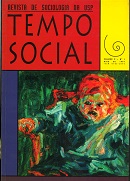Remarks about the failure of police models
DOI:
https://doi.org/10.1590/ts.v9i1.86441Keywords:
Police, Organizations, World view, ElitesAbstract
This paper shows how the police took diverse organizational forms in national contexts, instead of producing in its agents everywhere a very similar world view. Centrally or locally organized, the men/women in charge express themselves in the same terms. We try to explain this trend by pointing to the daily experience of policing which are shared by all police forces, and where any explanation of police thinking must be sought. We present as example the daily activities of Rio de Janeiro’s police in early twentieth-century, showing their relation with the elites and how they create at the same time the boundaries of police authority and the perception of the existence of certain groups against whom extra-legal means of pressure can be exerted.Downloads
References
ADIALA, Júlio César. (1996) A criminalização dos entorpecentes. Dissertação (Mestrado). Rio de Janeiro, IUPERJ.
BAYLEY, David H. (1992) Comparative organization of the police in englishspeaking countries. In: TONRY, Michael & MORRIS, Norval. Modern policing. Chicago, University of Chicago Press. p. 509-546.
BESSE, Susan. (1989) Crimes of passion: the campaign against wife killing in Brazil, 1910-1940. Journal of Social History, 22 (4): 653-666, summer.
BRODEUR, Jean Paul. (1992) High policing and low policing: remarks about the policing of political activities. In: MCCORMICK, Kevin R. E. & VISANO, Livy A. Understanding police. Toronto, University of Toronto Press, p. 277-299.
BROGDEN, Mike. (1987) The emergence of the police – the colonial dimension. British Journal of Criminology, 27: 4-14.
CAIN, Maureen. (1992) Trends in the sociology of police work. In: MCCORMICK, Kevin R. E. & VISANO, Livy A. Understanding police. Toronto, University of Toronto Press. p. 3-32.
EMSLEY, Clive. (1993) Mother, what did policemen do when there weren’t any motors? The law and the regulation of motor traffic in England, 1900-1939. The Historical Journal, p. 357-381.
FAUSTO, Bóris. (1984) Crime e cotidiano: a criminalidade em São Paulo (1880-1924). São Paulo, Brasiliense.
MANNING, Peter. (1977) Police work. Cambridge, Mass, Cambridge University Press.
MARTIN, Benjamin. (1984) The hipocrisy of justice in the belle époque. Baton Rouge, Louisiana State University Press.
PALMER, Stanley. (1988) Police and protest in England and Ireland, 1780-1850. Cambridge, Cambridge University Press.
PERNAMBUCO FILHO & BOTELHO, Adauto. (1924) Vícios sociais elegantes. Rio de Janeiro, Livraria Francisco Alves.
REINER, Robert. (1992) Cop culture. In: The politics of the police. 2nd edition. Toronto, The University of Toronto Press. p. 107-137.
ROLPHE, Laurence J. (1983) Police and penal correction in Mexico city, 1876-1911: a study of order and progress in Porfirian Mexico. Tese (Doutorado). Tulane University.
SINDALL, Rob. (1983) Middle-class crime in nineteenth-century England. Criminal Justice History, 4: 23-40.
SKOLNICK, Jerome H. (1966) Justice without trial. Law enforcement in democratic society. New York, MacMillan.
VADACKUMCHERY, James. (1996) Human rights and the police in India. New Delhi, APH Publishers Corporation.
WEINBERGER, Barbara. (1995) The best police in the world. An oral histoty of enghish policing from the 1930's to the 1960's. Aldershot, Scolar Press.
Downloads
Published
Issue
Section
License
Copyright (c) 1997 Tempo Social

This work is licensed under a Creative Commons Attribution-NonCommercial 4.0 International License.


